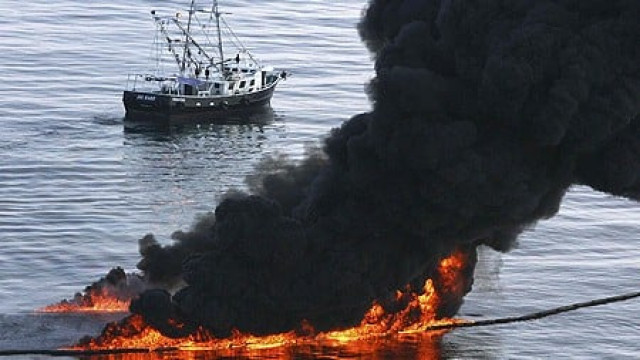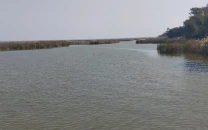Oil slick reported at Clifton beach
Spill in process of dilution, claims WWF official

Smoke billows from a controlled burn of spilled oil off the Louisiana coast. PHOTO: REUTERS
Khan shared that this is not the first time that such an oil spill has been reported on the Karachi coast. A similar slick appeared at Sandspit on May 20 which alerted all concerned agencies.
Upon receiving the report of an oil spill, a team of WWF-Pakistan visited the area and found that the oil slick is not widely spread in seaward direction and is restricted to intertidal area.
Free Wi-Fi for Karachi's Benazir Bhutto Park visitors soon
The oil has already weathered, Khan said, adding that the spill is now in the process of dilution and does not seem to pose any immediate threat to the marine fauna and flora. However, people should avoid visiting the beach until the water becomes completely free from slick, he advised.
Khan further added that the oil slick could be due to either release of oil from oil-reception facilities near the coast or leaks from a ship passing by the area. The oil was ultimately pushed by high monsoon winds and currents towards the sandy beach at Clifton.
The oil is now stranded in an intertidal area, mainly accumulating at the high tide watermark, leaving black lines or globs of oil on the beach as the tides recede, said Khan. He added that sunlight, high temperature, wind and waves will gradually break apart oil and it will finally disappear.
Three Chinese naval ships arrive in Karachi
Khan also stressed on the need for tracking of oil slicks so that it can be ensured that such spills do not move towards sensitive marine habitats and biodiversity hotspots.
According to WWF-Pakistan Sindh and Balochistan Regional Head Dr Babar Khan, there is no immediate threat to turtle beach as the wind and wave circulation pattern from west to east is presently under the influence of a south-westerly monsoon.



















COMMENTS
Comments are moderated and generally will be posted if they are on-topic and not abusive.
For more information, please see our Comments FAQ